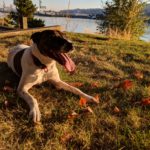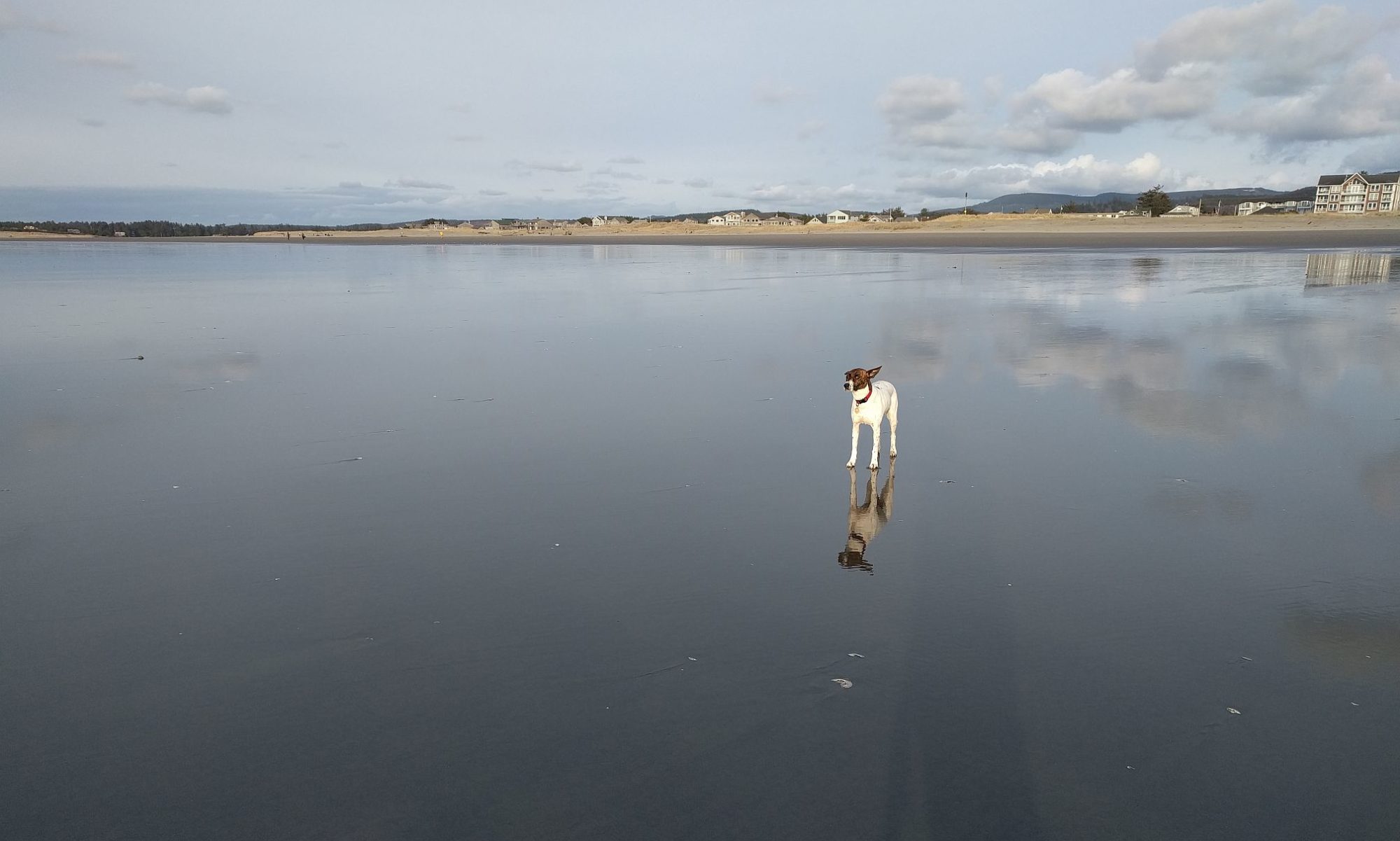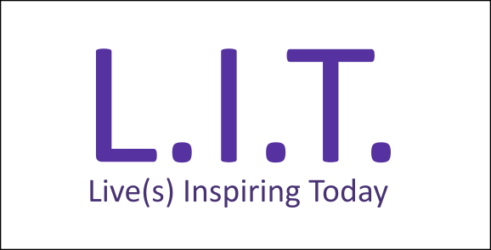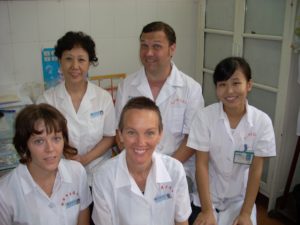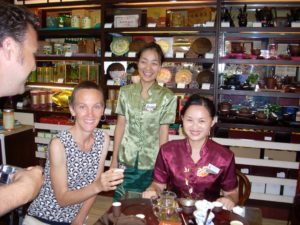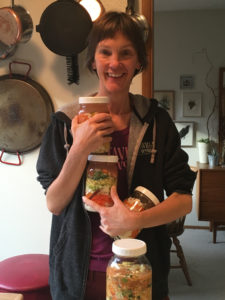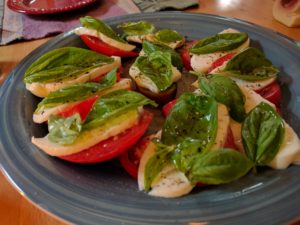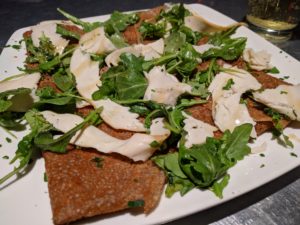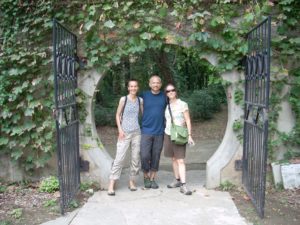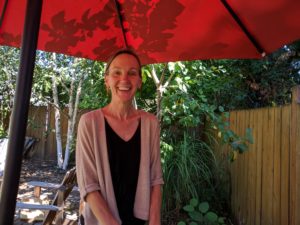 “We live in a vastly complex society which has been able to provide us with a multitude of material things, and this is good, but people are beginning to suspect we have paid a high spiritual price for our plenty.”
“We live in a vastly complex society which has been able to provide us with a multitude of material things, and this is good, but people are beginning to suspect we have paid a high spiritual price for our plenty.”
Euell Gibbons
When I first met Colleen Bunker, LAC, with her needles and certification as a Nutritional Therapist, I was waking up at 2 or 3am many mornings and lying restless for hours. I suffered a chronic hip pain and hoped acupuncture might help me to hike the mountains and snooze through the night. Almost 50, enrolled in massage school, and learning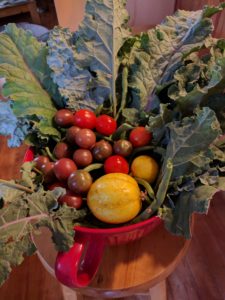 g to use my brain, body and hands in new ways, I felt stressed.
g to use my brain, body and hands in new ways, I felt stressed.
Colleen had begun acupuncture school at age 45, after years of managing a whole-food co-op in Maine. Before that she had an acre market-garden, three green houses and grew food for the store and elsewhere.
While working at the co-op, her father fell terminally ill and moved into her home. She still had two teenage boys around, and a man on the board of the co-op noticed her di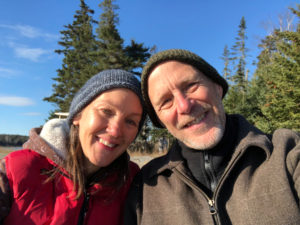 stress: “You need to come see me,” he said, and those visits were her introduction to acupuncture.
stress: “You need to come see me,” he said, and those visits were her introduction to acupuncture.
She also met her now-husband, Joe, at the co-op, also a board member. They eventually moved to Vermont where he studied Meditation and Conflict Resolution. She continued to receive acupuncture treatments, and several years later they moved to Portland, Oregon where she enrolled at OCOM (Oregon School of Oriental Medicine).
After her three-years of study, 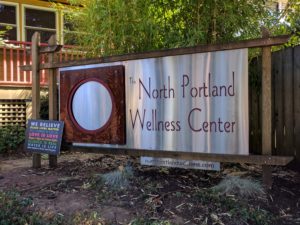 she spent six weeks in China, practicing her new art. Back to Portland, she landed her gig at the North Portland Wellness Center where we met.
she spent six weeks in China, practicing her new art. Back to Portland, she landed her gig at the North Portland Wellness Center where we met.
“I could’ve been going to a Zen monastery,” she laughs. “It was intense mental stress, hard on me, hard on my body.” If she knew then what she knows now about the changes of a woman’s body as we age, she probably wouldn’t have chosen this path.
Yet, she loves her work, especially when patients want more than simply the needles to cure them.
“I often become an all-around support person,” she says. “People come to me with pain, because they aren’t sleeping well, with Diabetes or to quit smoking. I can’t cure any of that. It must come from inside. Lifestyle changes are essential, and some people won’t come back when I say that.”
Rather than as a “healer” Colleen, hesitantly, thinks of herself as a “teacher”. She sees herself as someone who inspires others toward their own wellness and wholeness. “Very quickly, as quick as I can, I want to see past whatever they present. People come in telling their stories. Sometimes there’s no crack, but I’m of no service or value to people if I simply join them in their story.”
“People see the needles placed behind the ears on TV infomercials. They come to me wanting these needles to make them quit smoking. Often they come because someone else told them they’d better–a spouse or roommate. I tell them there is no needle protocol to cure their addiction. You have to decide inside yourself. You have to decide you want to do it. Set a date, and I’ll help you do it. Acupuncture will help.”
She’s learned that she can’t help someone to heal when they are stressed. “But I can knock them out with needles,” and sometimes that’s the kind of rest a person needs most.
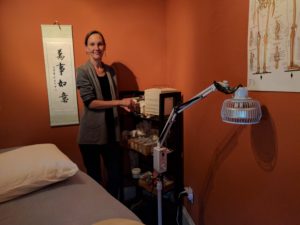 “Of course it’s satisfying when a patient says ‘This was so helpful,’ but we heal ourselves,” Colleen insists. “Our physical health manifests from our thoughts. When I can inspire someone to change how they think–and the needles help–it’s a good day.”
“Of course it’s satisfying when a patient says ‘This was so helpful,’ but we heal ourselves,” Colleen insists. “Our physical health manifests from our thoughts. When I can inspire someone to change how they think–and the needles help–it’s a good day.”
NUTRITION FOR BODY & MIND
After beginning her work as an acupuncturist, Colleen began to feel under-prepared to work with some of the patients who showed up–especially those with diabetes. She wanted to understand more of the science around blood-sugar regulation and be able to explain the importance of nutrition to her patients.
“My nana was the first to instill in me that what you eat makes a difference in your overall health. You can reverse illness with food,” Colleen says.
“I come from farmers and gardeners, and fishermen. Eule Gibbons, along with Adele Davis, were people that my grandmother was interested in, and I would flip through their books the way a child does. They made me aware that not everyone thought about food the same way. It sparked an early interest in how food might influence health.”
“I could see something wasn’t working at the clinic, but I didn’t know what. Kaiser was putting people on plant-based diets, with more carbs, and this isn’t the answer.” She felt frustrated and soon enrolled with the Nutritional Therapy Association in Olympia, Washington.
Trying to help people regulate their blood sugar and understand how Type II Diabetes can be caught early and cured became a mission. Another area of interest has been working with women.
There is no specific “Diet for Women Over 50”, but a balanced whole-foods habit of eating becomes that much more important as we age–especially for woman. The ovaries no longer produce hormones, and more demand is put on the adrenal glands and, especially, the liver. Eating good fat become more important for hormone production in the body.
For any patients interested, Colleen will share what she knows. “But I no longer try to convince anyone to eat how I think they should eat.”
About a year into my visits, Colleen changed her own diet: Hot flashes were happening often, her sleep was restless, and , worse, “brain-fog” began to tax her in a way that felt threatening to her work and ease. She stopped eating gluten, dairy and sugar, and her mind became more clear.
For breakfast she typically eats two over-easy eggs, sweet potato, avocado, greens and drinks coffee. She’ll change it up, but the key is to balance macro-nutrients: Carbohydrates, Good Fat, and Protein for every meal.
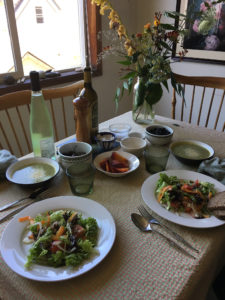 “People are still really afraid of fat, but eating a high-carb diet is the problem for most–especially naked carbs (which are a lot like eating sugar, turning into body-fat unless immediately utilized for energy). To avoid “Naked carbs”, pair rice with avocado; bread with cheese; apple with almond butter; pasta with olive oil–a carbohydrate with a good fat!
“People are still really afraid of fat, but eating a high-carb diet is the problem for most–especially naked carbs (which are a lot like eating sugar, turning into body-fat unless immediately utilized for energy). To avoid “Naked carbs”, pair rice with avocado; bread with cheese; apple with almond butter; pasta with olive oil–a carbohydrate with a good fat!
Like our mothers told us, “Chewing is important. The process works better when we chew well. Digestion starts in your brain.”
To support the liver, limit consumption of caffeine, alcohol and sugar she advises. “Sugar is toxic to anyone, but don’t try making the change while your sister’s baking her cookies! Enjoy your life.”
“I don’t have it daily, even weekly, but I have a piece of cake once in a while. Get away from adding and needing sugar,” she suggests.
Other dietary adjustments can help people depending on their circumstance. Anyone with an autoimmune challenge can benefit from avoiding gluten. “There is lots of evidence,” she says. Gluten increases inflammation, and those of us who suffer achy joints and arthritis can feel more ease by avoiding foods that increase the pressure on joints.
If we all choose whole foods–a variety of fruits, vegetables, legumes, meat, dairy and whatever protein-good fat-and carbs that fit into our preference, with each meal–we can find our balance and maximize well-being.
“Most people know what they’re eating too much of. The best thing is to become intuitive–and to listen to yourself.”
TOWARD EASE & FLOW: CHANGE YOUR THOUGHT, CHANGE YOUR BODY
After almost ten years of working at the North Portland Wellness Center, Colleen has observed, “It’s much easier to change your diet than to change the chronic thought patterns that stress you out.”
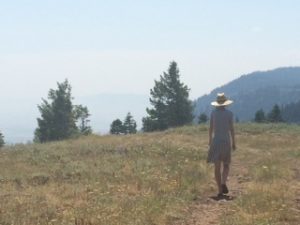 “Many women are rockin’ with their diets. They say, ‘I’ve done everything you want me to do, and I’m still miserable.’ But they haven’t changed the way they live. They haven’t looked at their daily habits.”
“Many women are rockin’ with their diets. They say, ‘I’ve done everything you want me to do, and I’m still miserable.’ But they haven’t changed the way they live. They haven’t looked at their daily habits.”
In Chinese Medicine, the liver is associated with creativity. When we are not living in a way that nourishes this organ, stress can reek havoc in our bodies.
“Take up anything you think you want to do,” Colleen encourages. “And think, ‘I’m going to cut everyone a bit of slack, beginning with myself.”
“A change of thought isn’t going to happen overnight, but over time, if you shift, things change,” she smiles. “Going to work and going home need to feel the same as going on vacation. If it doesn’t, focus on anything that is working. Appreciate everything. If you’re a teacher, mediate on the one child who inspires you. You do it for yourself and not for them, but you will benefit them.”
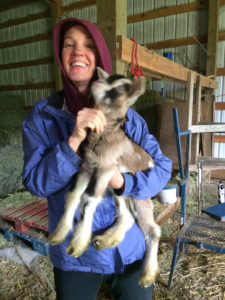
“If you’re too rigid, working too hard, driven to control too many people, and not working toward more ease and flow in your life, things aren’t going to change for the better.”
And, she says, “If you have total ease and flow every day, then you have more leeway in your diet.”
“When a woman comes to menopause or peri-menopause and suffers continuous hot flashes, sleeplessness and other symptoms, her life isn’t balanced,” Colleen says. “We must look at the whole picture, our overall satisfaction, lingering frustrations, unresolved anxiety, and negative feelings.”
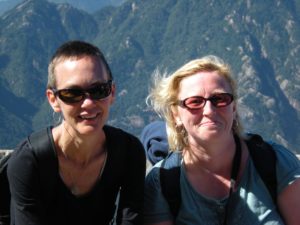
She also insists pain isn’t necessary. “You might need to change your habits, including your diet, but feeling pain isn’t a given.”
Though our food and life choices become more important as we age, a good diet matters for all. “If women in their 20s would eat a whole foods diet and learn to live well, they would age more easily. Not all women suffer hot flashes just like not all women suffer painful menstruation or morning sickness.”
Colleen is a straight-talker, and I like that.
“You attract people who resonate with your style,” she says. “Other people can help us to make shifts, but it must come from within.” Those who only want needles to “cure” them of their problem don’t tend to return to her for long.
Cutting down on my sugar intake has helped. With encouragement from Colleen, I began making sauerkraut and make sure to get some probiotics into my gut each day. Drinking more than a half-glass of wine in one sitting seems to tax my system in the way eating a chocolate chip cookie with refined sugar will leave me feeling a 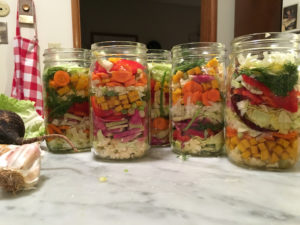 bit off-kilter. I also pay attention to how I move in the world, my thoughts, and I meditate most mornings. More recently I’ve cut out gluten, at least for now: I love walking and hiking, and I’ll do what I can to keep enjoying these simple pleasures. The pain I reported when first visiting Colleen is much less and often not present at all.
bit off-kilter. I also pay attention to how I move in the world, my thoughts, and I meditate most mornings. More recently I’ve cut out gluten, at least for now: I love walking and hiking, and I’ll do what I can to keep enjoying these simple pleasures. The pain I reported when first visiting Colleen is much less and often not present at all.
Both of us jumped into a new study of bones, muscles, numbers and meridians to memorize at a time when many people were settling into a groove, climbing career ladders, or newly freed of the child-rearing demands that had shaped their lives for decades. We were both beginning anew, and these choices invited plenty of stress, yet we both now enjoy being creative in new ways–good for the liver!
THE MOVE BACK TO MAINE
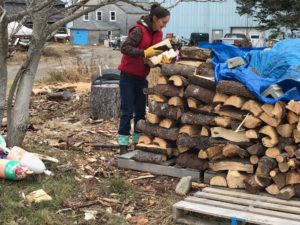 At the beginning of October, Colleen and Joe began a three-week journey across the United States. They have returned to her native Maine. Before departure, she had begun eating her favorite Sourdough Hard Red-Wheat Boule from her favorite Portland bakery near Mt. Tabor. Like my choice to keep adding milk to my coffee, eating cheese, yogurt and even the occasional ice cream, she’s choosing to again indulge in good bread. She’s back to gluten.
At the beginning of October, Colleen and Joe began a three-week journey across the United States. They have returned to her native Maine. Before departure, she had begun eating her favorite Sourdough Hard Red-Wheat Boule from her favorite Portland bakery near Mt. Tabor. Like my choice to keep adding milk to my coffee, eating cheese, yogurt and even the occasional ice cream, she’s choosing to again indulge in good bread. She’s back to gluten.
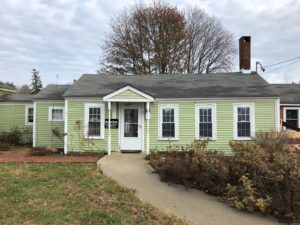
It’s always a matter of balance. No one way of eating, just like no one way of living, will fit every life. “Acupuncture is great as is nutrition, joy and meditation. There is no best path, no one way.”
As she remakes her life on Mt. Dessert Island in Maine, she will create her own way of healing, no longer employee of a wellness center. She’s excited for this new venture. Look her up when you’re out her way.
Colleen Bunker welcomes your contact at [email protected]
Links you may like. . .
Some recommendations from Colleen. . .
www.chriskresser.com
Chris Kresser is a functional medicine doc and an acupuncturist. He studies all the current research on food, supplements etc. and then gives a very good interpretation of the findings so that people can make better informed decisions about their healthcare.
http://nourishingtraditions.com/
“The first really influential book on nutrition that I stumbled upon while at OCOM is Nourishing Traditions: The Cookbook That Challenges Politically Correct Nutrition and The Diet Dicotocrats by Sally Fallon. She founded the Weston A Price Foundation, www.westonaprice.org and their website is also fabulous.”
8 Steps to a Pain-Free Back, by Esther Gokhale, L.Ac. with Susan Adams, Pendo Press, 2008. See her website at http://gokhalemethod.com/
Healthwatch with Dr. David Naimon: Interviews with experts in Natural Medicine, Nutrition, and the Politics of Health
